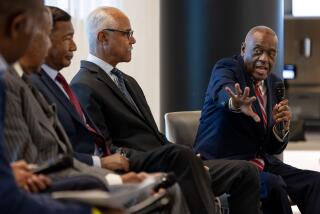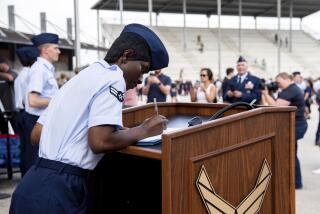ARMED FORCES : Gung-Ho Spirit Among Young Blacks Declines : Persian Gulf War, less recruiting advertising among reasons cited for the falloff.
WASHINGTON — Among the predominantly black student body at Eastern High School--the District of Columbia’s largest secondary school--the Persian Gulf War seems to have had a distinctly sobering effect.
For years, the school has guided promising graduates to the military, where they could get training, educational benefits and steady employment. Until the Persian Gulf War, it seemed, few thought they also could get killed.
That stark reminder has dampened a tradition of high interest in the military at Eastern High School, said guidance counselor William Lawton. This year at Eastern, fewer young people plan to pursue a military career, reflecting a decline in interest in military service among young black people nationwide. Pentagon officials concede the war appears to have been a factor.
According to a yearly telephone survey of 16- to 21-year-olds conducted for the Defense Department, interest in joining the military among young black men has dropped from 53% to 42% in just two years.
Overall, 29% of America’s young people said they “definitely” or “probably” would enlist in one of the armed services in the next few years, down three percentage points from 32% in 1989 and 1990.
Christopher Jehn, the Pentagon’s manpower chief, suggested two possibilities for the steeper drop among blacks: a decline in recruitment advertising overall and the lingering debate over whether blacks would have died in disproportionate numbers had U.S. casualties been heavy in the Gulf War.
“There was a certain amount of glamour to the military” before 540,000 U.S. troops--roughly one-quarter of them black--were dispatched to the Gulf, said Lawton of Eastern High. “But when the realities of a war strike home, these youngsters start to think really seriously about their options.”
For 18-year-old Marvin Robinson III, a junior at Eastern, the Gulf War and the debate that swirled around it put a sudden brake on what had been a rush toward the military. On the eve of last year’s war, Robinson--a participant in the Junior Reserve Office Training Corps since 1989--was about to sign up to go to boot camp.
But when the war began, Robinson had a sudden change of heart, and decided to defer the crucial first step toward enlistment.
“Two years ago, I was definitely all for going into the service,” said Robinson. “When the recruiter comes, he doesn’t mention fighting in a war; all he talks about is the good things. . . . But you’ve got to face reality that the military’s primary mission is fighting wars. My mom wouldn’t have been able to take it if I had had to go over there, and I have to consider whether I could.”
Lawton said word is spreading that the U.S. military is no longer the “sure thing” it once was, now that personnel cutbacks have lowered enlistment slots and raised standards for new recruits.
Pentagon recruitment figures suggest that the changes already have depressed enlistment among young blacks.
As the military scales back its yearly enlistments, it will be able to select the high school graduates who are the best performers on military aptitude tests. Statistically, blacks’ performance in those tests has clustered them around the bottom of those applying.
Senior defense officials like defense manpower chief Jehn say the Pentagon will remain committed to maintaining a racially diverse force. But he adds that the Pentagon’s “colorblind” personnel policy would not permit the use of quotas to maintain current proportions of blacks in the military. As a result, experts believe that as many as 110,000 military jobs now filled by blacks could disappear during the next five years.
Low Point in Black Enlistment
The Defense Department says interest among young black men in joining the military has dropped dramatically. The Pentagon’s manpower chief calls the dip significant.
Enlistment
Percentage of enlistees entering the military who are black:
1980: 22.1%
1991: 17%
Major Military Role
Blacks as a percentage of overall military (officer and enlisted)
1991: 20.6%
Black youths as a percentage of U.S. population of 18-24-year-olds:
1990: 13.9%
Source: Defense Department, U.S. Census
More to Read
Sign up for Essential California
The most important California stories and recommendations in your inbox every morning.
You may occasionally receive promotional content from the Los Angeles Times.











